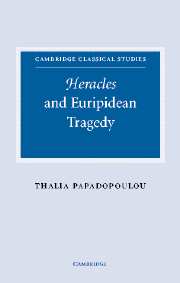Conclusion
Published online by Cambridge University Press: 22 September 2009
Summary
In this book I have argued that Heracles is a far more complex tragedy than many critics have thought. Euripides exploits the conflicting views of ancient tradition about Heracles' nature and arete. The superlative strength that Heracles exhibited during his labours is laudable, but its transference from wildness into civilization becomes problematic. The play suggests that the solution is provided by the civic (and Athenocentric) context, where individuality and the archaic type of heroic excellence give way to solidarity and the value of community.
The drama is of central significance for an understanding of the religious universe of Euripidean tragedy. The extent to which in this play the divine imposition of madness upon Heracles questions the role of the gods, their justice and their concern for humans, is almost unique in the extant Euripidean corpus. Even in plays which portray vindictive gods, the dramatist attempts at least to show some justification for divine action. In Hippolytus, Aphrodite punishes Hippolytus because he refused to worship her, and she explicitly says that, when she receives honours from mortals, she reciprocates. In Bacchae, Pentheus is destroyed by Dionysus, but his death is presented as the result of his impiety towards the god. In both cases, to be sure, human suffering is enormous for all mortals involved in the dramatic action, but the gods are not left without serious motives for their actions.
- Type
- Chapter
- Information
- Heracles and Euripidean Tragedy , pp. 190 - 194Publisher: Cambridge University PressPrint publication year: 2005



